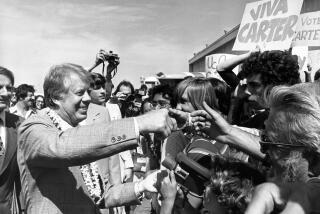James St. Clair; Nixon’s Attorney During Watergate
- Share via
James D. St. Clair, a pillar of the Boston legal community who made notable appearances before Congress and the federal courts in an effort to save President Richard M. Nixon from the scandal of Watergate, has died.
St. Clair died Saturday at a nursing home in Westwood, Mass., after a long illness. He was 80.
Few lawyers have faced greater challenges than St. Clair confronted as the president’s attorney in 1974, with the drumbeat of Watergate revelations mounting, his client increasingly beleaguered, and ominous talk circulating of a constitutional crisis.
On July 8, 1974, St. Clair appeared before the Supreme Court to contend that the president was shielded by executive privilege from the efforts of Watergate Special Prosecutor Leon Jaworski to obtain the Watergate tapes. Ten days later, St. Clair made his final arguments before the House Judiciary Committee as it prepared articles of impeachment against Nixon in connection with the 1972 break-in at Democratic National Committee headquarters.
One of the members of the committee, M. Caldwell Butler (R-Va.), was later quoted in “The Final Days,” by Bob Woodward and Carl Bernstein, as crediting St. Clair with a “masterful presentation” that would have carried the day had the panel been a jury.
But the committee voted articles of impeachment, the Supreme Court ruled in the case of United States vs. Nixon that the tapes would have to be surrendered and Nixon resigned.
Years later, another member of the impeachment panel described St. Clair as his hero, one whom other lawyers might well emulate. Former Rep. Robert F. Drinan (D-Mass.), a Jesuit priest, wrote in the newspaper Legal Times in 1996 that St. Clair “did what lawyers are supposed to do--tell your client to obey the law and maintain inviolate the confidences of your client.”
Twenty-two years after Nixon resigned, Drinan wrote, “Mr. St. Clair continues to refuse to write, speak or even refer to his role as counsel” to the former president.
Woodward and Bernstein wrote that St. Clair was unmatched in trial preparation and “was reputed to be a courtroom wizard.”
St. Clair gained recognition in 1954 as chief assistant to Joseph Welch, counsel for the Army during Senate hearings led by Sen. Joseph R. McCarthy (R-Wis.) on Communist infiltration in the armed services. St. Clair was a protege of Welch.
St. Clair was also involved in a number of high-profile cases in Boston and headed a commission investigating the Boston Police Department in 1991.
In the early 1960s, St. Clair represented Frederick Wiseman, the filmmaker whose documentary of conditions at Bridgewater State Hospital, “Titicut Follies,” was banned in Massachusetts. In 1968, he defended the Rev. William Sloane Coffin Jr., the Yale chaplain brought to trial for advising young men to avoid the draft.
He represented the Boston School Committee in a landmark desegregation lawsuit brought by black parents in the 1970s.
St. Clair was born in Akron, Ohio, and graduated from the University of Illinois. He received a law degree from Harvard in 1947 after studies that were interrupted by Navy service in San Pedro, Calif., during World War II.
Survivors include his wife of 56 years, Billie, three children and eight grandchildren.
More to Read
Sign up for Essential California
The most important California stories and recommendations in your inbox every morning.
You may occasionally receive promotional content from the Los Angeles Times.












